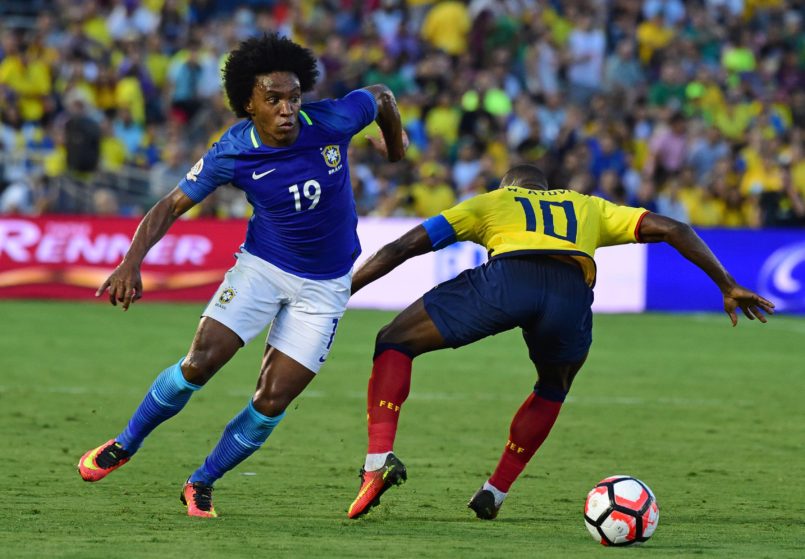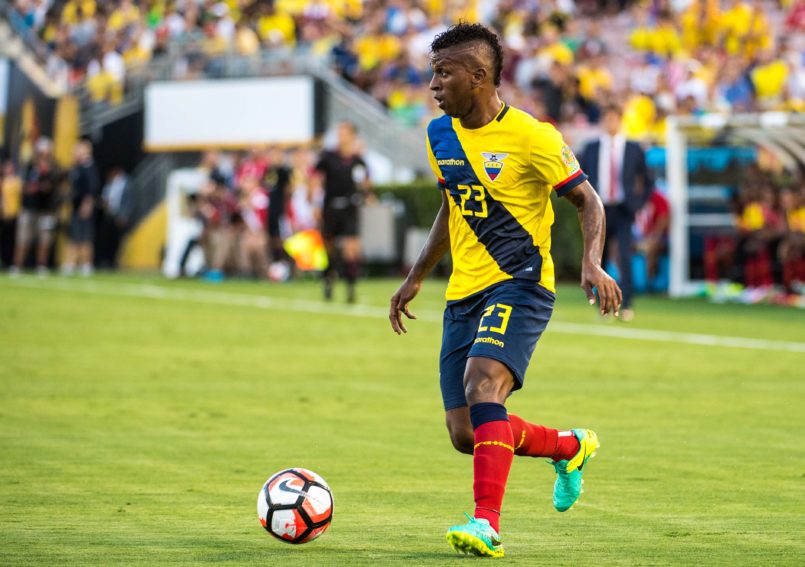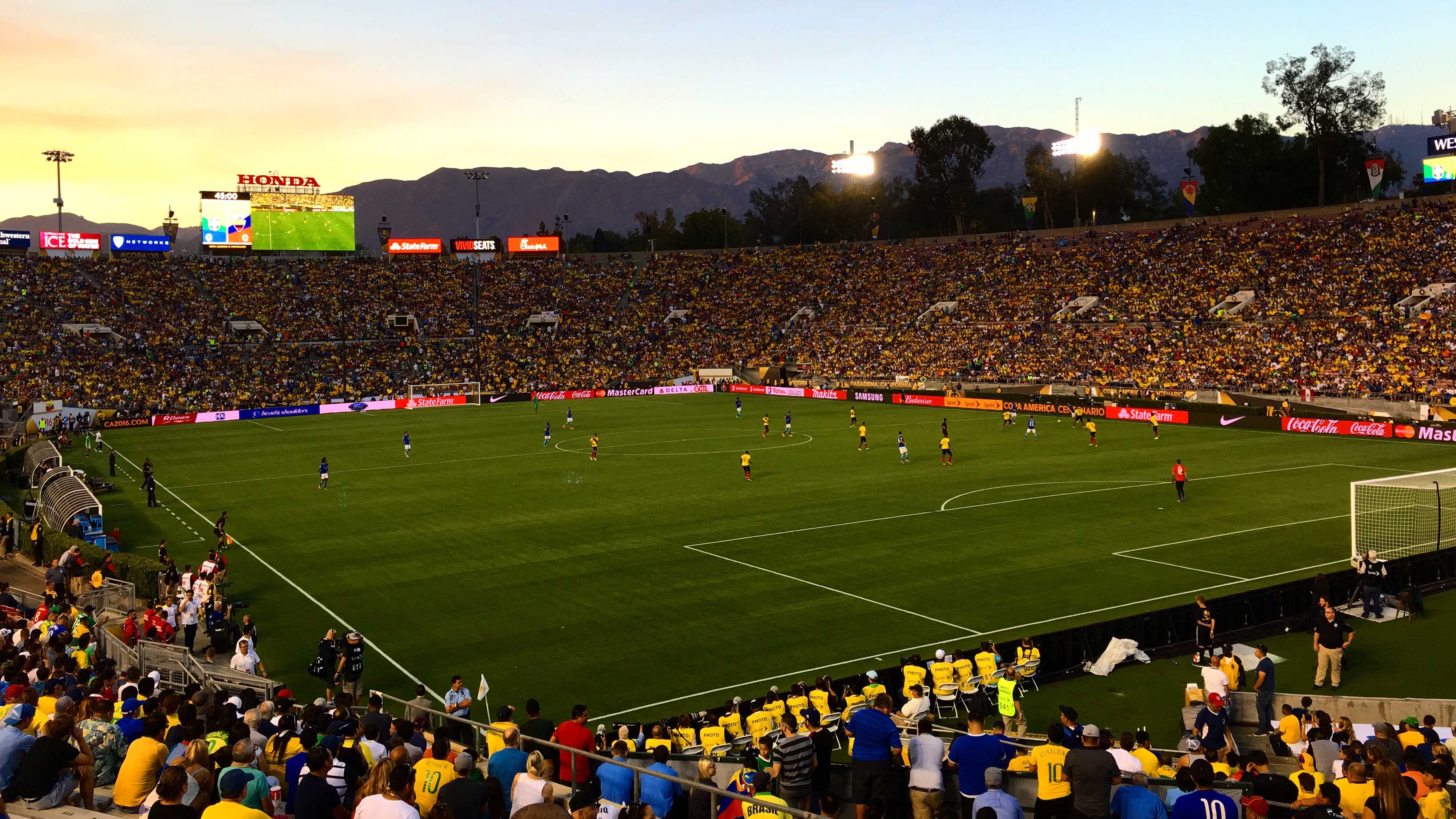Brazil vs. Ecuador
Copa America
June 4, 2016
Rose Bowl Stadium
Pasadena, CA
As a boy in the United States in the early ’90s, the only thing I knew about soccer was that Brazil was good at it, and the only thing I knew about Brazil was that they were good at soccer. Pele was the greatest player in the history of the game, explained a neighboring kid with the kind of certainty only a ten-year-old with esoteric knowledge can conjure. The sport’s most popular shoe was named for the country’s most popular music. When the Brazilians came to the US in 1994, that they would win the World Cup was a given. In the same way that Nebraska was college football and the Blue Jays were baseball, Brazil was soccer.
Twenty-two years after that ’94 Cup and with the Seleção back on American soil for the first time since, that may no longer be the case. They exited the 2014 World Cup on their home turf in the most embarrassing fashion possible, losing 7–1 to eventual champions Germany in the tournament’s semi-final. They come to the Copa America having won only two of six qualifiers for the 2018 World Cup and are in legitimate danger of missing the tournament for the first time in its history. For Copa, they are missing Neymar, their captain, who is sitting out the tournament to rest for this summer’s Olympics, and they’re missing defenders David Luiz and Thiago Silva, too. These are big-name players whose absences assuredly impact Brazil’s chances of making any kind of run at the Copa America this year, which in turn could make gaining any international momentum difficult for the squad.
All of this is true, and none of it mattered on Saturday night in Pasadena. I know this, because I didn’t know any of the above as a friend and I shuffled our way into the Rose Bowl to watch Brazil take on Ecuador. What I knew: anyone willing to brave a trip up the 110 could watch Brazil play soccer at the Rose Bowl Stadium; if there’s a better confluence of sport and venue anywhere on this continent this summer, I don’t know about it. A robust friendly series between European clubs notwithstanding, world-class soccer doesn’t come to the US that often, and Brazil is always Brazil, even when they’re not. At kickoff, the sun was beginning to set behind the press box, spilling orange and red alpenglow over the San Gabriel Mountains in the distance. Below, the men in blue controlled possession from the match’s earliest moments.
In a kind of inverse of hockey, whose frenetic pace appears more controlled in person, the speed and complexity of soccer are more apparent in real life. Brazilian defender Dani Alves cycled the ball through Ecuadorian defenders, sending seemingly inadvisable passes through herds of yellow shirts and hitting his targets in stride. The small one-on-one matchups that appear languorous on TV emerged as minor solos, miniature games unfolding in the broader context of the match itself. Winger Willian, who shut down the right flank of the field for much of the first half, moved the ball with a fluidity and grace that seemed balletic; as his body lurched right, he’d drag the ball behind himself and heel it to his left, where in one deft motion he’d catch his own pass and power toward the goal.

Willian maneuvers around Ecuador’s Walter Ayovi / photo by Robyn Beck/AFP/Getty Images
While Ecuador struggled to retain possession for much of the match, in the thirty-fifth minute a loose ball squirted away from a Brazilian defender, leaving nothing between Ecuador and goaltender Alisson. Brazil Midfielder Elías slid into the striking Ecuadorian from behind, eliciting a throaty response from the already raucous (and heavily partisan) crowd (and earning himself a yellow card in the process). The Brazilian fans, who had been no less quiet, began to chant their side’s name in response. Incredibly, the exact same sequence played out again only three minutes later, and between the obvious frustration of the Brazilian side, the sudden surging of Ecuador, and the feverish anxiety of the 52,000-plus in attendance, a goal felt imminent.
Ecuador are currently tied with Uruguay atop the CONMEBOL table, but they’ve only beaten Brazil twice in twenty-nine meetings across all competitions; in a game that had only seen a handful of realistic scoring chances, the momentum generated by the pair of yellow cards felt nearly as important as a successful sequence. Instead, Willian went down with what seemed to be a horrific injury, and the moment passed. He would be back before injury time.
And then, in the sixty-sixth minute, Ecuador seemed to cross the threshold. Jefferson Montero squirted a ball between a pair of Brazilian defenders, dropping it right at the touchline. Ecuador’s Miller Bolaños swung it in front of the goal, where it bounced off of Alisson and into the net. The goal was immediately called back, though in the stands the reason why wasn’t clear. Boos and chants rang from the Ecuadorian fans, and they only intensified when a Brazilian player went down with an injury moments later.

Ecuador’s Miller Bolaños / photo by Shaun Clark/Getty Images
Several minutes after that, Willian (who was showing no sign of the apparent leg-snapping from the first half) lined up to take a free kick. As he calmly took his steps back from the ball, both sides shouted louder. The Brazilians chanted their name, clapping three times in succession. The Ecuadorians answered, voicing their own country’s name like a rowing command. The farther back Willian stepped, the louder it got; the lengthening space between his feet and the ball stretched the evening’s goalless tension nearly to breaking. Throughout the night, at least five different chants spilled into one another from around the Rose Bowl. As Willian prepared to step into his kick, they became a whitewater of sound.
His shot didn’t hit the net, and neither did anyone else’s, and the moment the referees signaled the end of the game, boos poured from the stands. It was a disappointing ending for an ascendant Ecuadorian side looking to topple Brazil on a down year, and an equally disappointing result for a Brazilian side looking to find their footing.
This is a down Brazil squad. Even I can see that, and my soccer literacy is roughly equivalent to my Portuguese literacy (Olá!). Willian and Alves and Philippe Coutinho are all world-class players, but without Neymar, they lack a game-changing presence on the pitch. Still, they showed flashes on Saturday night of what they can be, crossing up defenders and playing a furtive form of tiki-taka. It isn’t exactly the beautiful game, but even if they miss a few measures, it’s still football with a samba beat. FL







